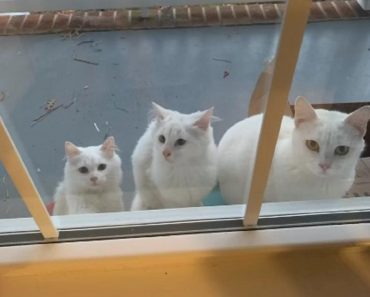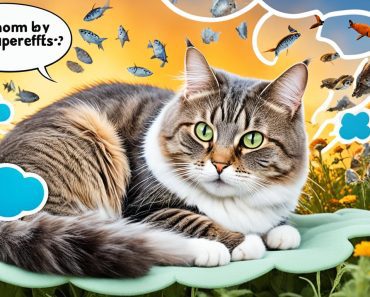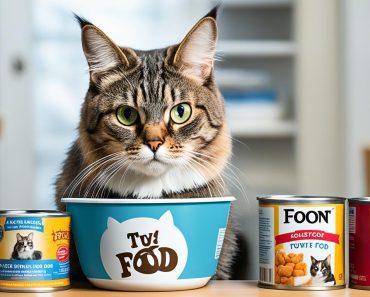Olive oil is a common ingredient in human cooking, but what about our feline friends? Can cats safely consume olive oil? As a cat owner, I understand the importance of ensuring the well-being of our beloved pets. In this article, I will explore the potential health benefits and risks of feeding olive oil to cats, providing you with valuable insights and tips to keep your furry friend safe and healthy.
Can Cats Eat Olive Oil? Yes, but in small amounts.
- While cats can eat olives in small quantities as an occasional treat, olive oil should be given in very small amounts or avoided altogether.
- Feeding your cat a small portion of olive as a snack a couple of times a week should be fine, as long as they have not shown any negative reactions in the past.
- It’s important to monitor the sodium content in your cat’s diet, as olives are high in sodium.
- Consult with your veterinarian before introducing any new food to your cat’s diet to ensure their overall health and wellness.
- Remember to prioritize a balanced diet that meets your cat’s specific nutritional needs for their optimum health.
Why Do Cats Love Olives?
Many cat owners have noticed their cats showing interest in olives. There are theories that suggest cats may love the taste of olives or enjoy the interactive experience of treat time. Olives, particularly green olives, contain a compound called nepetalactone, which is similar to the compound found in catnip.
Nepetalactone stimulates the vomeronasal organ in a cat’s throat, causing mind-altering effects and behavior changes. It triggers a variety of responses, including relaxation, excitement, and increased playfulness. This compound can create an intense olfactory experience for cats, making olives intriguing and desirable to them.
However, it’s important to note that not all cats react the same way to olives or catnip. While some cats may go wild for olives, others may show no interest at all. Cats have unique preferences and sensitivities, and their response to olives may vary.
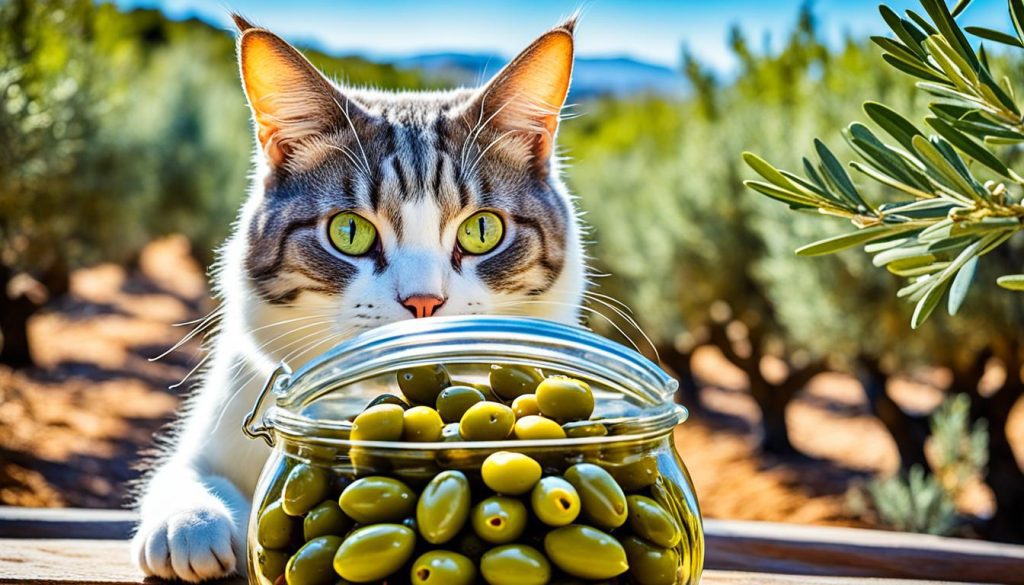
Can Cats Eat Olives Safely?
Olives are generally considered safe for cats to eat in small quantities. Feeding your cat a small portion of olive as a snack a couple of times a week should be fine, as long as they have not shown any negative reactions in the past. However, it’s important to note that olives should be regarded as empty-calorie treats for cats and should not make up more than 10% of their daily caloric intake.
One of the main concerns when it comes to feeding olives to cats is the high sodium content. Olives are naturally high in sodium, which can be problematic for cats, especially those with certain health conditions like heart disease or kidney disease. Therefore, it’s essential to monitor the sodium intake in your cat’s diet and ensure it stays within safe limits.
Feeding your cat olives in moderation can be a way to provide them with a different taste experience, especially if they have shown an interest in olives. However, it’s always recommended to consult with your veterinarian before introducing any new food to your cat’s diet, including olives.
As with any treat or addition to their diet, it’s essential to observe your cat’s behavior and watch for any signs of adverse reactions. If your cat shows any symptoms such as vomiting, diarrhea, or gastrointestinal discomfort after consuming olives, it’s best to discontinue feeding them to your feline friend.
Remember, the well-being and health of your cat should always be the top priority. Providing a balanced and nutritious diet tailored to their specific needs is key to keeping them happy and healthy.
Can Cats Have Olive Oil?
Olive oil is a popular ingredient in human cooking, but is it safe for cats to consume? While olives are generally considered safe in small quantities, the same cannot be said for olive oil. While not poisonous, consuming excessive amounts of olive oil or any type of fat can lead to digestive issues in cats, such as diarrhea and vomiting.
It’s important to remember that cats have specific nutritional needs, and their digestive systems are not designed to handle certain foods in large quantities. Olive oil should not be a regular addition to a cat’s diet and should only be given in very small amounts or as an occasional treat. It’s always a good idea to consult with your veterinarian before introducing any new food to your cat’s diet.
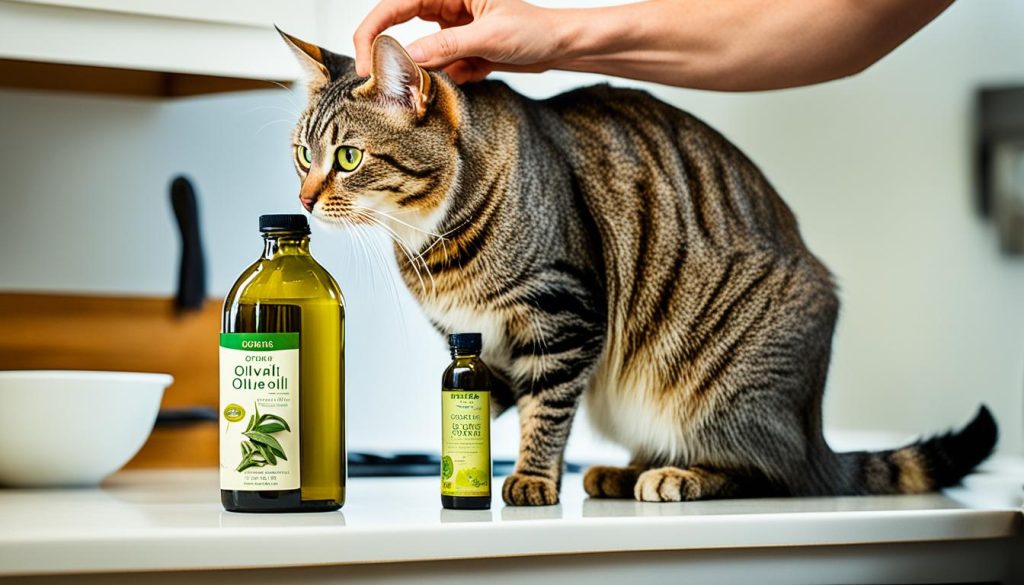
Safety Concerns About Olives and Olive Oil
While olives are generally safe for cats, it’s important to be aware of certain safety concerns. There are specific factors to consider when it comes to olives and olive oil in relation to your cat’s health. Here are some important points:
Safety Concerns of Olives for Cats
- Olives that are stuffed with harmful ingredients like blue cheese, almonds, garlic, sausage, or pickled jalapenos can be toxic to cats. These ingredients can cause stomach upset, gastrointestinal disturbances, or more severe reactions in feline companions.
- Pits in olives pose dangers to cats, as they can pose a choking hazard or even cause intestinal obstruction if swallowed. It’s crucial to remove the pits before offering olives to your cat.
- Sodium toxicity is a concern in cats, particularly those with specific health conditions like heart disease or kidney disease. Olives that have been brined may contain high levels of sodium, and excessive sodium intake can be harmful to your cat’s well-being.
- While olives are generally safe in moderation, olive oil should be given with caution. Digestive issues such as diarrhea and vomiting can occur if cats consume excessive amounts of olive oil or any type of fat.
- It’s essential to remember that olive oil should not be a regular addition to your cat’s diet. Instead, it should be given sparingly or as an occasional treat.
To ensure the well-being of your feline friend, it’s always wise to consult with your veterinarian before introducing new foods like olives or olive oil into their diet. They can provide personalized advice based on your cat’s specific needs and health conditions.
For a visual representation of olives, please refer to the image below:
Remember to prioritize your cat’s safety and overall health when it comes to their nutrition, and stay informed about the potential risks associated with feeding olives or olive oil.
Conclusion
It is important for cat owners to consider the safety and potential risks when it comes to feeding olives and olive oil to their feline friends. While cats can enjoy olives as an occasional treat, it is crucial to keep the quantity small and avoid olives that are stuffed with harmful ingredients. However, when it comes to olive oil, it is best to give it to cats in very small amounts or even avoid it altogether.
Although olives are generally safe, they have a high sodium content, which can be detrimental to cats with certain health conditions. Therefore, it is advisable to consult with a veterinarian before introducing any new food, including olives, into a cat’s diet. Prioritizing the overall health and well-being of our furry companions is of utmost importance, and providing them with a balanced diet that meets their specific nutritional needs is key.
Remember, while olives may be intriguing to cats and olive oil may have health benefits for humans, it is essential to consider the unique dietary requirements of our feline friends. Consulting with a veterinarian and being proactive about a cat’s diet can ensure their optimal health and happiness.



